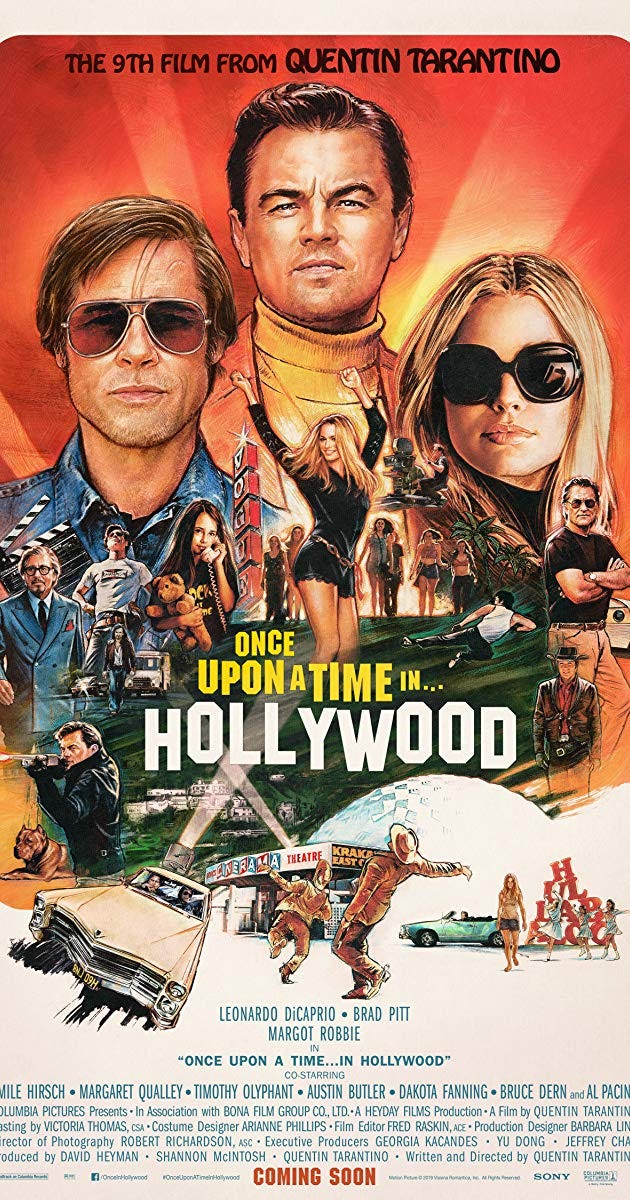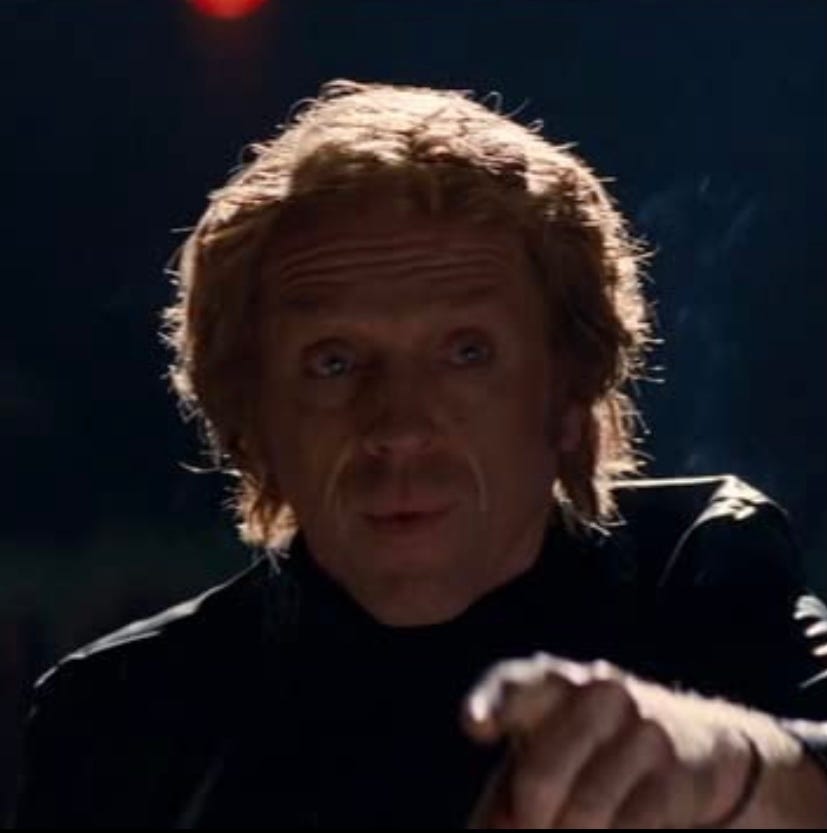Once Upon A Time In Hollywood, A Fascist Fairytale
Why Quentin Tarantino’s latest movie is both his best dramatization, and subtle critique, of American fascism
Quentin Tarantino’s latest movie Once Upon A Time In Hollywood is his perhaps his most timely, defiant, and subversive yet. And given his filmography, that’s saying something. For the past decade or so, he has made historical movies, westerns and war films that are very much period pieces. While this one is set fifty years in the past, its characterization, themes, and style make it feel more contemporary than its setting. It feels like that rarest of things, that only filmmaking can provide—a window into the present. Tarantino achieved a similar effect in Jackie Brown, which was a window into 1990s California. Hollywood is also told with a subtlety and deliberateness that makes it feel both more relatable and distant in the right ways. While his historical movies, Inglourious Basterds, Django Unchained and The Hateful Eight, were outlandish and cartoonish riffs on historical events, Hollywood is grounded and restrained. Yet we are living in the age of Trump, where restraint and maturity scarcely exist, and all reality is an outlandish cartoon.
This contradiction between our moment and the tone of the movie runs throughout, and is what gives the movie its power to show us ourselves, to force us to confront and see ourselves. Only what is most in tension with the present can reveal the present in its full truth. Tarantino is in many ways a dinosaur, the last of his kind, an art house director with universal name recognition who can command a huge budget and nationwide release for his movies. He is perhaps the only filmmaker we have who can create a totally original world that feels lived in and grounded, yet also cinematically heightened, but without costumed superheroes or franchise tie-ins. Yet his value lies precisely in this anachronism—he is a man from a bygone era, yet still working today, making a movie about the past, and the synthesis of this tension provides some much-needed clarity on our own present, which often seems hopelessly opaque.
By engaging with the present in this way, despite setting the movie fifty years in the past, Tarantino is addressing us as directly as he ever has. This is what we wanted from him, but the reception by media shows that we should be careful what we ask for. He is responding to the criticisms that have been leveled against him recently, the movement to “cancel” him, and even the rumors about his foot fetish. In some ways it is a break with his problematic past—it’s his first movie made without Harvey Weinstein’s Miramax Production Company. There is barely any scandalous language, no use of the n-word, no sex, and little violence until the very end. He is giving the media and cultural gatekeepers what they want, but also showing that giving them what they want can backfire and expose them. It is his first self-consciously woke movie, yet this necessarily means it is also his best critique of wokeness, as everything carries with it its own negation. The negation of the woke tendencies of the film is a kind of fascism that runs through all Tarantino’s movies, and is most subtly but inescapably present here.
For several films now, Tarantino has wrestled with the specter of Nazism. They are a constant villain that must be destroyed as violently as possible. Why are Nazis such a preoccupation for him? As a master of cinema, it is no wonder why—the Germans pioneered expressionistic filmmaking in the 1920s, with Fritz Lang, F.W. Murnau, and others. And it shouldn’t be denied that Joseph Goebbels produced expert propaganda films throughout the Nazi period. It could even be said that film itself is an inherently fascistic medium, with the overwhelming largeness of the screen commanding complete submission, in visual and audial terms. To experience a film, you must submit yourself to it, and you don’t know where it will take you.
Right up until they were defeated, when it was clear that their cause was lost, the Nazis kept making propaganda films. In 1945 they poured huge amounts of money into Kolberg, a propaganda film intended to bolster the will of the German people despite the stark reality of total defeat. It was a fairy tale, and fairy tales are central to fascism. In Hollywood, Tarantino creates an alternate history in which the Manson murderers are defeated, the Summer of Love never ends, and the 1960s go on forever. In this alternate timeline that he creates, perhaps we never see the neoliberal turn of the 1970s, the Reagan Revolution of the 1980s, and the grotesque carnival of Trumpism, which was borne out of neoliberal turn and the Reagan Revolution.
But what makes possible this defeat of Manson in the film, this preservation of the Summer of Love and the indefinite extension of the spirit of the 1960s? It is a greater form of psychopath, a more acceptable kind who can pass in the workplace and in the neighborhood. It is Brad Pitt’s stuntman Cliff Booth who fights off the Manson family, and when he visits their compound earlier in the film, one of the members remarks that Charlie would really dig him. Booth is a wife killer who engages in violence frequently throughout the film—indeed he is by far the most violent character, getting in unnecessarily over the top fights throughout the film. Charlie Manson and Cliff are mirror images of each other, each as free and adrift as the other. Cliff is more self-reliant, needing only his loyal pitbull Brandy and his boss/friend Rick Dalton (Leonardo DiCaprio). The only force that can stop Manson’s communal psychopathy is Booth’s classic lone wolf American psychopathy, who does not need to rely on anyone else for his ultraviolence.
The Manson Family members are portrayed as basically proto-millennial hipsters, play-acting at being murderers and home invaders. The casting of Lena Dunham as sort of the mother goose of the Manson compound underscores this nicely. They all have to work up the nerve to get on with the murders, while Cliff Booth knocks them away like they’re mosquitoes. He’s the real thing, the ironclad core of traditional American violence, that these hippy imitators can’t possibly hope to compete with. He is referenced as being a war hero, and carries himself with that kind of quiet, steely dignity. It is this that saves America from the Manson atrocities, one of the worst crimes of the century, the one that finally destroyed its innocence once and for all, and that perhaps paved the way for the soulless neoliberal period.
DiCaprio’s Rick Dalton is a former TV star whose movie career has dried up. The traditional rugged type was, by the end of the 1960s, being replaced by shaggy, skinny types. Dalton played Jake Cahill, the title character on a 1950s show Bounty Killer. When Susan Atkins hatches the idea to kill the “piggies” in Rick’s house (who lives next door to Sharon Tate and Roman Polansky), she sarcastically apologizes to Patty Krenwinkle who huffily explains to her who Rick Dalton was, saying “Sorry I don’t know who every TV fascist from the 1950s was!”
Dalton played a kind of fascist on TV in the 50s, and then moved into making westerns and war films, most notably The Fourteen Fists Of McCluskey, where he uses a blowtorch to incinerate the Nazi high command, an act of extreme violence justified by the evil incarnate of the Nazi high command. In the final scene of Hollywood, Dalton dons his flamethrower (which he kept in his toolshed), and torches Susan Atkins. In this moment, he regains his former masculine power, he recaptures his best moments. We are seemingly only at our best when we are at our most violent, because that is when we are truly tested, when we can at last become who we are. But in this way we cannot help but descend into fascism while at the same time thinking that we are overcoming it. After the Allies beat the Nazis, the U.S. got to work starting their global empire, first by nuking Hiroshima and Nagasaki, then committing genocides first in Korea, then in Indochina, and eventually in Iraq. But this is how America has chosen to get our groove back, just as Dalton got his back by torching Susan Atkins.
After torching Susan Atkins, Dalton is invited into Sharon Tate’s (Margot Robbie) gated palace, where the idealized blonde starlet welcomes him as a hero. She had never invited him in before, they had never interacted. But by getting in touch with his fascist roots, he has made himself worthy of being a courtier of the idealized, angelic, perfect blonde actress, Sharon Tate. It is a fairytale ending—Dalton is the perfect knight, and Tate is the perfect Lady. The fantasy of how Sharon Tate is idealized into this perfect angelic blonde starlet, safe in her home, protected from the Manson Family, is made possible by the “heroism” of Cliff Booth, who is stabbed and carted off to an ambulance. Booth is also, again, a truly dangerous murderer who has somehow been allowed to hang around in semi-polite society. This fairytale ending, which Dalton alone enjoys, is only possible because of his longstanding association with a character who is, in many ways, the immoral equal of Charles Manson, but who can hold it together just a bit more. Is this not the American ideal? A man always ready for the most savage violence, but who can look like anyone else, for the most part?
Once Upon A Time In Hollywood is a fairytale, it is a movie about ideology, but also under the sway of ideology. Rarely does anything clear cut through this haze of shadows, illusions, and fairytales, except for the brief monologue by Steve McQueen (Damian Lewis) early in the film. McQueen, observing Tate and her husband Roman Polanski, as well as her friend Jay Sebring, dancing at the Playboy Mansion, details their bizarre, inexplicable relationship. Why is it that Sharon Tate is attracted to men who look like they could be twelve years old, as McQueen puts it? Why does Jay Sebring hang around this married woman all the time? McQueen is one of the most overtly disheveled, strung out, red-eyed, unwholesome characters we see.
Contrasted with Polanski, Tate, or even Booth and Dalton, it’s night and day. He knows too much, he sees through everything, knows the history of all the relationships, and can apply rational, clear-sighted standards to it. He is a philosopher, a critic, not in tune with the ideology, but separate from it. He isn’t part of the fairy tale. The other characters are in tune with the ideology. McQueen sees too clearly, he sees reality, and because of that, he is excluded from the fairytale drama, much as he would like to be part of it. Philosophers have no part in a fascist fairytale.






This essay in some way conflicts with my own impressions of the movie, but also leads me to realize that I'm not even sure what I really think about the movie. All I know is that it did make a strong impression on me. Very different from Tarantino's other films, in a good way. I'm gonna have to rewatch it.